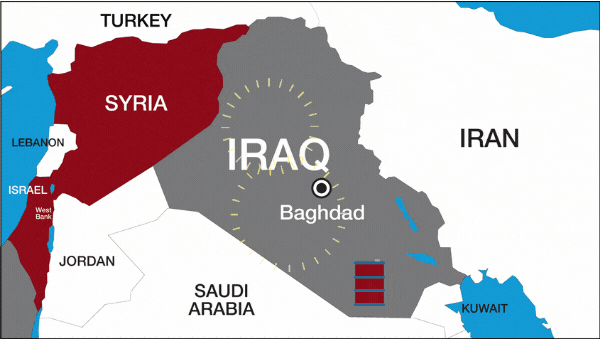As analysts in the oil sector keep their focus
firmly on the spat between the two important Middle Eastern allies, they seemed
to have inadvertently missed the attention on an equally important – and relevant
– player in the Middle East – Iraq.
Iraq has the world’s 5th largest oil reserves and is
the sixth largest exporter of the commodity in the world, with India, the world’s
third largest consumer, being a main buyer.
Despite an increasing flow of oil revenue, the
subjects in the main oil regions are often in the streets in protest against
the lack of basics, not the luxuries; the absence of a steady power supply in
the middle of sweltering, unbearable heat has been just one of the main grievances
for months.
Iran supplies a substantial amount of electricity
needs of Iraq and recently suspended its supply for two reasons: Iraq owes Iran
payments for the electricity; Iran has its own issues with power outages across
the country, exacerbated by severe drought in some regions
In addition, Iraqis are up in arms against rampant
corruption, mismanagement and nepotism.
Against this backdrop, the deadly bomb attack on
Monday in Sadr City in Iraq, which resulted in deaths of more than 35 people
and injuries to more than 60 people, resurrects a grim reminder of an even bigger
conflict – with sectarian dimensions.
Sadr City is a mainly Shite neighbourhood. The suicide
bomber targeted the location on the eve of a major Muslim religious event, with
the clear intention of causing maximum carnage, while people were shopping for
the festival in question.
ISIS, the Sunni militant group, claimed the
responsibility for the attack. They launched a similar attack in April this
year too.
The Sunnis in post-Saddam Iraq have been complaining
about the discrimination against them by Shia rulers. Their grievances, more
often than not, fell on deaf ears of those who used to govern the country. It
ultimately led to the birth of the ISIS, an extremist Sunni group, which caused
havoc in the region at first, and then across the world.
In short, analysts believe this could have nipped in
the bud.
Iraq is a country with more than 2/3 being the Shite
Muslims. It, however, was ruled by the Sunnis for decades until Saddam Hussain
was overthrown. Of course, during that time, Shite had the same grievances over
being ruled by a minority.
When President Trump came to power, one of the main
policy decisions made was to wage war against the ISIS in Iraq with a Western military
coalition. Iran-backed militia in the region played a significant role too in
complementing the task, although it was not widely acknowledged.
The military coalition finally achieved the success
in a matter of months and Iraqis enjoyed relative peace for some time.
Since then, in a matter of just three years, with
the change of administrations did come the instability back in Iraq; falling
oil price during the period did not help the existing governments either.
With the ever diminishing role of the US in the
region, particularly in Iraq, the Iraqis will be forced to fend for themselves
if the ISIS gets a firm foothold back in Iraq; nor will the West ever get
involved in yet another military conflict in the region, unless the US is at
the forefront; the current situation in Afghanistan is a classic example that explicitly
illustrates the evolving US foreign policy – no more involvement in ‘for-ever-wars’.
If the ISIS expands its influence well into the oil
producing area, there will be a fierce competition between the Iraqi security
forces to grab the oil fields; if it happens, it is just a matter of history
repeating itself, when the militants fill in their coffers at the expense of
vital government revenue.
If the falling oil revenue was solely to blame for
the current Iraqi woes, the world would have sympathized with the country. With
the price of oil fluctuating around $70 a barrel in recent months, that cannot
be the case.
Two successive, major fires at Covid-19 hospitals,
which led to the deaths of many hapless patients, just show where the blame
should fall on when it comes to dealing with key issues; this happened in a
country, which used to have a health system that was envy of the world – when a
dictator was in power, of course.
Ordinary Iraqis of walks of life are frustrated to
the core with the never ending political instability in the country while sitting
on a major resource for generating revenue; they look at the prosperous neighbours
in similar situations and wonder why Iraq oscillates between relative calm and
outright carnage at regular intervals.
If the grim security situation on the ground, coupled
with incompetent management, gets worse, Iraqis will be compelled to blame
it on democracy too – within a long list
of grievances; it may not be just scapegoating!







